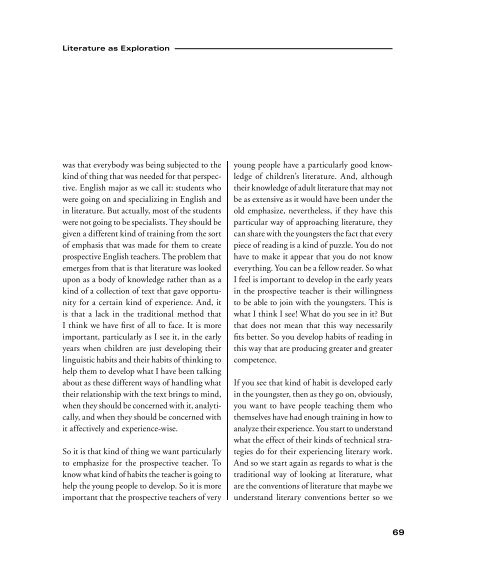Tidskrift för lärarutbildning och forskning 4/2005
Tidskrift för lärarutbildning och forskning 4/2005
Tidskrift för lärarutbildning och forskning 4/2005
You also want an ePaper? Increase the reach of your titles
YUMPU automatically turns print PDFs into web optimized ePapers that Google loves.
Literature as Exploration<br />
was that everybody was being subjected to the<br />
kind of thing that was needed for that perspective.<br />
English major as we call it: students who<br />
were going on and specializing in English and<br />
in literature. But actually, most of the students<br />
were not going to be specialists. They should be<br />
given a different kind of training from the sort<br />
of emphasis that was made for them to create<br />
prospective English teachers. The problem that<br />
emerges from that is that literature was looked<br />
upon as a body of knowledge rather than as a<br />
kind of a collection of text that gave opportunity<br />
for a certain kind of experience. And, it<br />
is that a lack in the traditional method that<br />
I think we have first of all to face. It is more<br />
important, particularly as I see it, in the early<br />
years when children are just developing their<br />
linguistic habits and their habits of thinking to<br />
help them to develop what I have been talking<br />
about as these different ways of handling what<br />
their relationship with the text brings to mind,<br />
when they should be concerned with it, analytically,<br />
and when they should be concerned with<br />
it affectively and experience-wise.<br />
So it is that kind of thing we want particularly<br />
to emphasize for the prospective teacher. To<br />
know what kind of habits the teacher is going to<br />
help the young people to develop. So it is more<br />
important that the prospective teachers of very<br />
young people have a particularly good knowledge<br />
of children’s literature. And, although<br />
their knowledge of adult literature that may not<br />
be as extensive as it would have been under the<br />
old emphasize, nevertheless, if they have this<br />
particular way of approaching literature, they<br />
can share with the youngsters the fact that every<br />
piece of reading is a kind of puzzle. You do not<br />
have to make it appear that you do not know<br />
everything. You can be a fellow reader. So what<br />
I feel is important to develop in the early years<br />
in the prospective teacher is their willingness<br />
to be able to join with the youngsters. This is<br />
what I think I see! What do you see in it But<br />
that does not mean that this way necessarily<br />
fits better. So you develop habits of reading in<br />
this way that are producing greater and greater<br />
competence.<br />
If you see that kind of habit is developed early<br />
in the youngster, then as they go on, obviously,<br />
you want to have people teaching them who<br />
themselves have had enough training in how to<br />
analyze their experience. You start to understand<br />
what the effect of their kinds of technical strategies<br />
do for their experiencing literary work.<br />
And so we start again as regards to what is the<br />
traditional way of looking at literature, what<br />
are the conventions of literature that maybe we<br />
understand literary conventions better so we<br />
69

















